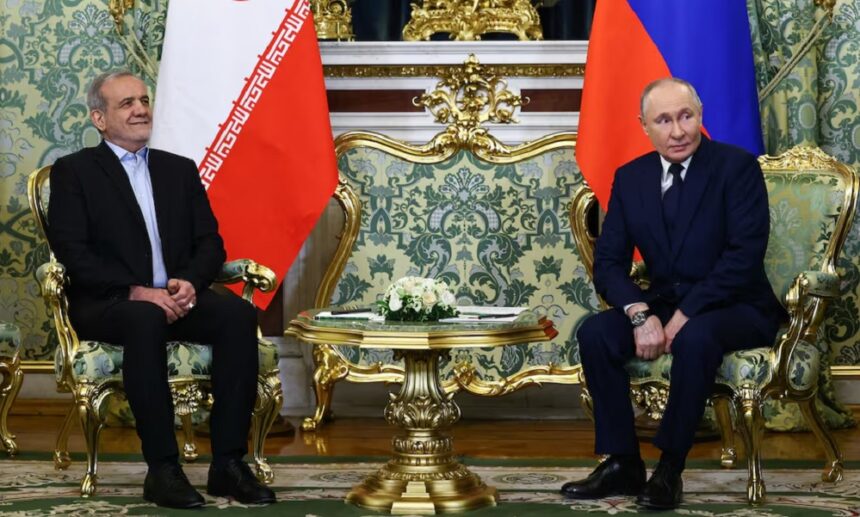Russian President Vladimir Putin and his Iranian counterpart Masoud Pezeshkian deepened military ties between their countries on Friday by signing a 20-year strategic partnership that is likely to worry the West.
Under the agreement, Russia and Iran will boost cooperation in a range of areas including their security services, military drills, warship port visits and joint officer training, Reuters reported.
Neither will allow their territory to be used for any action that threatens the other and will provide no help to an aggressor attacking either nation, according to the text, which also said they would work together to counter military threats.
Russian President Vladimir Putin and his Iranian counterpart Masoud Pezeshkian deepened military ties between their countries on Friday by signing a 20-year strategic partnership that is likely to worry the West.
Under the agreement, Russia and Iran will boost cooperation in a range of areas including their security services, military drills, warship port visits and joint officer training.
Neither will allow their territory to be used for any action that threatens the other and will provide no help to an aggressor attacking either nation, according to the text, which also said they would work together to counter military threats.
Pezeshkian, on his first Kremlin visit since winning the presidency last July, hailed the treaty as an important new chapter in bilateral relations, while Putin said Moscow and Tehran shared many views on international affairs.
“This (treaty) creates better conditions for bilateral cooperation in all areas,” said Putin, emphasising the upside for economic ties and trade, which he said was mostly carried out in the two countries’ own currencies.
“We need less bureaucracy and more concrete action. Whatever difficulties are created by others, we will be able to overcome them and move forward,” Putin added, referring to Western sanctions on both countries.
Putin said Russia regularly informed Iran about what was going on in the Ukraine conflict and that they closely consulted on events in the Middle East and the South Caucasus region.
Russia and Iran were the main military allies of Syrian President Bashar al-Assad, who fled to Moscow after being toppled last month. The West also accuses Iran of providing missiles and drones for Russian attacks on Ukraine. Moscow and Tehran say their increasingly close ties are not directed against other countries.
Putin said work on a potential gas pipeline to carry Russian gas to Iran via Azerbaijan was progressing despite difficulties. He added that, despite delays in building new nuclear reactors for Iran, Moscow was also open to potentially taking on more nuclear projects.
‘MULTI-POLAR WORLD’
Pezeshkian, whose words were translated by Russian state TV, said the treaty showed that Moscow and Tehran did not need to heed the opinion of what he called “countries over the ocean”.
“The agreements we reached today are another stimulus when it comes to the creation of a multi-polar world,” he said, adding that he hoped the war in Ukraine could be ended at the negotiating table.
“War is not a good solution to resolve problems and we would welcome talks and achieving peace between… Russia and Ukraine,” Pezeshkian said.
Moscow has cultivated closer ties with Iran and other nations hostile towards the U.S. since the start of the Ukraine war. It already has strategic pacts with North Korea and close ally Belarus, as well as a partnership agreement with China.
Moscow has made extensive use of Iranian drones during the war in Ukraine. The United States accused Tehran in September of delivering close-range ballistic missiles to Russia for use against Ukraine. Tehran denies supplying drones or missiles.
The Kremlin has declined to confirm it has received Iranian missiles, but has acknowledged that its cooperation with Iran includes “the most sensitive areas”.
Russia has supplied Iran with S-300 air defence missile systems in the past and there have been reports in Iranian media of potential interest in buying more advanced systems such as the S-400 and of acquiring advanced Russian fighter jets.
Pezeshkian’s visit to Moscow comes at a time when Iran’s influence across the Middle East is in retreat, with the fall of Assad in Syria and the Israeli pounding of Iran-backed groups Hezbollah in Lebanon and Hamas in the Gaza Strip.
The fate of two major Russian military facilities in Syria remains uncertain following Assad’s fall.















